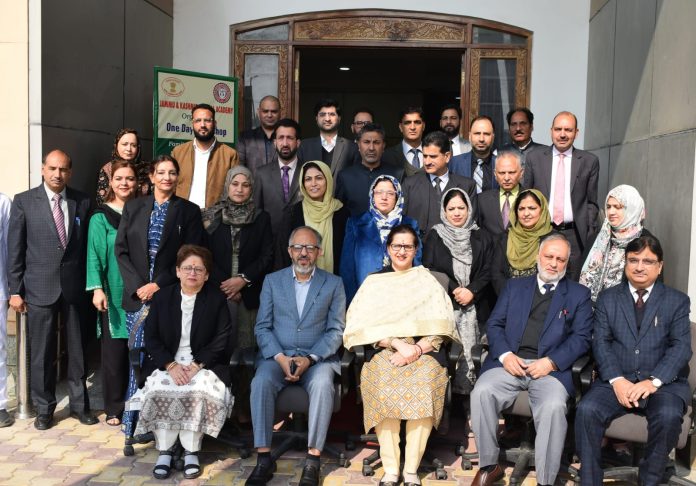SRINAGAR: Jammu and Kashmir Judicial Academy today organised one day workshop on ‘‘Family Court Matters and Special Marriage Act including Protection of Women from Domestic Violence Act, 2005
With the approval and guidance of Chief Justice High Court of Jammu & Kashmir & Ladakh (Patron in Chief J&K Judicial Academy), Tashi Rabstan and assistance from Chairperson Governing Committee for J&K Judicial Academy and members of Governing Committee, the J&K Judicial Academy organised this workshop for the judges of district judiciary of Kashmir province at J&K Judicial Academy, Mominabad Srinagar.
The Programme was inaugurated by Justice Sindhu Sharma, Judge High Court of J&K and Ladakh annual Chairperson Governing Committee for J&K Judicial Academy, in presence of Justice Rahul Bharti, Judge High Court of J&K and Ladakh and member Governing Committee for J&K Judicial Academy.
M.Y Akhoon, former District & Session Judge and Rajinder Saproo, Registrar Rules were the Resource Person during the workshop.
In her inaugural address, Justice Sindhu Sharma emphasised and deliberated upon the need for organising such workshops. She highlighted the importance of the family court matters, special marriage act & protection of women from domestic violence act 2005. She highlighted that the role of a judge while dealing with the family matters is not only important but also crucial. This is because Judge has to balance the law with compassion and with the rights of the parties and in balancing all these they look not only into the provision but also the human angle to it, she added.
Justice Sindhu Sharma emphasised the restitution of conjugal rights. She said the most difficuilt act which not in terms of the act but in terms of enforcement and dispensation of justice is “The Guardian and Wards Act” because the children are involved and every person and every individual who has to deal with the child has to look into the welfare of the child.Welfare of the child being paramount is the only consideration while considering the guardian and wards act, resolution of its disputes and the most important and difficult part is execution of the order.
Justice Rahul Bharti, in his special remarks, said that family court matters hold a significant place they involve not just the interpretation of laws but the understanding of emotions and societal values that govern families.The dissolution of marriages, restitution of conjugal rights and issues relating to guardianship are not just legal concepts but also deeply personal conflicts that demand a nuanced approach from the judiciary.
Justice Bharti, while sharing his experience with the participants, said that while dealing with such cases as a Judge there are two ways of looking at a thing any related to family disputes be it matrimonial, succession related, be it protection of women from domestic violence, children related which as a judge often overlook that the source of law starts from nothing but from the fact this is the reason of law. He said how society came into picture family is the unit from which the law originates first it’s the parental authority in a given household which makes new born into family growing up children to know that the parental authority is the name of some discipline.
He appreciated the district judges and said that since district judges are the top of the hierarchy of district judiciary, that is why they have to deal with family laws.
Director Judicial Academy, Sonia Gupta welcomed all the dignitaries, resource persons and judicial officers and delivered the introductory remarks
She said the workshop had been carefully designed for judicial officers of Kashmir province to explore the most pertinent issues surrounding the relevant laws.
The first session was led by Recourse Person M.Y Akhoon who focussed on family court matters, covering the dissolution of marriage, restitution of conjugal rights and the Guardian and wards act. He said family disputes often involve delicate emotions and in resolving these issues it requires to maintain a balance between empathy and the strict application of the law. The family Courts Act of 1984 allows government to establish family courts in areas with a population of over one million. He also discussed about the special marriage act which provides for a civil marriage that would enable individuals to get married outside of there respective community. The special marriage act provides with the some conditions for marriage under section the act had wholly changed the situation in respect of prohibited degrees in marriage. He also discussed various case laws related to the registration of marriage under special marriage act.
The second session was led by Resource Person, Rajinder Saproo, who discussed the Protection of women from Domestic violence Act 2005. He said domestic violence is a pervasive issue in society and the law provides robust protections for women facing abuse he covered the legal framework under the act including the role of various stakeholders in the resolution of family disputes and domestic violence cases. He provided practical guidance on resolving cases involving domestic violence and ensuring the protection of vulnerable parties.
The participants actively engaged during the sessions with the resource persons because the objective of the workshop was not just to learn but to ensure that the understanding of these laws strengthens the justice to be delivered in the courts.


